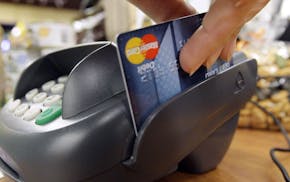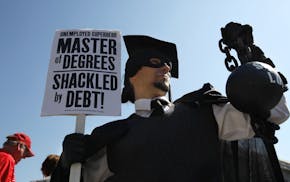Airlines raised ticket prices nine times in 2011, and they seem determined to maintain or exceed that pace in 2012. Earlier this week the nation's biggest carrier, Delta Air Lines, pushed through its second fare increase of the new year.
This, in a nutshell, is why consumers and government regulators should be wary of reports last week that Delta was weighing a bid for bankrupt American Airlines.
Minnesotans have more than an academic interest in whether Delta buys American. The Twin Cities is one of Delta's largest hubs, and the Atlanta-based company has more than 12,000 employees in the state.
Even if the Twin Cities hub were preserved after such a merger, some of those jobs would be at risk as the airline would likely search for the elusive synergy that accompanies such mega acquisitions, according to longtime airline analyst Ray Neidl at the Maxim Group.
For its part, the Atlanta-based carrier has declined to comment on speculation that, on the surface, seems preposterous. Then again, the prospect of regulators approving a marriage between Delta and Northwest also seemed far-fetched at one time.
Could Delta's CEO, Richard Anderson, pull off another merger miracle with the much larger American? Probably, but a better question to ask is why government regulators would ever give him the chance. Any deal that allows either Delta or US Airways to use American to fortify its defenses against competition would be bad for consumers all around.
I can almost hear some travelers wondering how things could possibly get worse. But as much as consumers like to gripe about the cost and the hassle of flying, the truth is they have never had it so good. Adjusted for inflation, and despite some sharp increases in the past two years, average domestic airfares have fallen 16 percent since 1995, even after factoring in baggage fees. Strip those out, and the price decline is 21 percent.
Prices are even down at fortress hubs like the Twin Cities, Detroit and Atlanta. Those airports may still be dominated by one carrier, but low-cost carriers are making greater inroads. In the Twin Cities, 10 percent of travelers flew on a low-cost airline, up from 7 percent a few years ago.
Despite those gains, a revisionist history of the airline industry has begun to emerge in recent years that says, in short, that deregulation of the industry in 1979 was a mistake.
It's certainly been tough on airlines, particularly the "legacy" carriers like Northwest, Delta, American and United. Before deregulation, competition was minimal to nonexistent, and prices -- set by government bureaucrats -- ensured a healthy profit.
Since then, not so much.
University of California economist Severin Borenstein, a frequent adviser on airline mergers, says that U.S. airlines lost $60 billion in the 30 years ending in 2009. More than 150 carriers have gone bankrupt, including six of the 10 largest U.S. airlines by passenger volume.
That's been brutal for airline workers. In the last decade alone, the industry shed some 135,000 jobs, or 25 percent of its workforce. Those who remain are likely working for lower pay and reduced benefits.
But don't think this means that it's impossible to make money flying people to and fro. More people than ever are flying, and some airlines, like Southwest and JetBlue, consistently make money.
The old argument, that low-cost carriers can do this because they don't have same legacy costs as the older airlines, no longer applies. Delta, United and US Airways have used bankruptcy to shed or shrink those costs, and American is now trying to do the same.
The low-cost carriers have succeeded, in part, by recognizing that an airline seat is a commodity. They have built their business plan and entire operation around the notion of selling that seat at as low a cost as possible.
Delta, American and United have a different business model. They maintain much more costly hub-and-spoke systems. They are less comfortable competing on price than they are on the reach of their networks, the ability to get you from one place in the world to another. These networks, which include international alliances that allow price-fixing among otherwise competing airlines, also provide a formidable defense against competition.
Here's another way to think of it, courtesy Borenstein: "The big airlines use their network advantage to exclude competition."
For that reason alone, Borenstein remains skeptical that regulators would ever approve a Delta merger with American.
Let's hope he's right.
ericw@startribune.com • 612-673-1736

Wieffering: Time to get over debit card fees
For Thrivent and others, warnings were there

With billions in sales, some co-ops are big business
